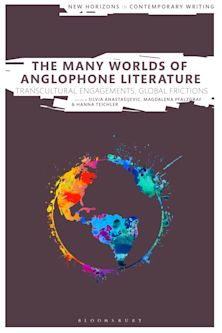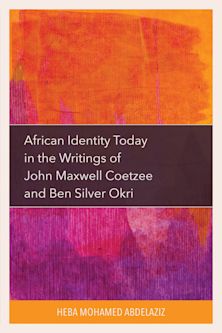- Home
- ACADEMIC
- Literary Studies
- African Literature
- The Pull of Postcolonial Nationhood
The Pull of Postcolonial Nationhood
Gender and Migration in Francophone African Literatures
The Pull of Postcolonial Nationhood
Gender and Migration in Francophone African Literatures
This product is usually dispatched within 1 week
- Delivery and returns info
-
Free CA delivery on orders $40 or over
You must sign in to add this item to your wishlist. Please sign in or create an account
Description
While the male-dominated Francophone African migrant literary tradition includes women writers, there is no study that attends to this subgroup of writers. The Pull of Postcolonial Nationhood: Gender and Migration in Francophone African Literatures pioneers the study of these writers as a category through an examination of three major women who exemplify the Francophone African female migrant literary tradition: Ken Bugul, Calixthe Beyala, and Fatou Diome. By studying these women together, Ayo A. Coly innovatively introduces gender into prevailing theories of Francophone African migrant literatures. These theories, in line with the current surge of postnationalism in cultural criticism, claim that questions of home and nationhood are obsolete for the present generation of Francophone African migrant writers, but this book shows that the opposite is true in the texts of these writers. Coly is thus able to demonstrate how claims of postnationalism are often skewed by gender-blind understandings of nationalism, namely a failure to consider that women have traditionally been the sites for discourses and practices of nationalism. Amid the negative currency of home and nation in contemporary cultural criticism, including postcolonial criticism, this book contends that home remains a politically, ideologically, and emotionally loaded matter for postcolonial subjects.
Table of Contents
Part 2 Part I. Ken Bugul: From Self-Imposed Exile to Constrained Homecoming
Chapter 3 Chapter 1: The (non)Place of the Daughter of the Postcolonial House: Le Baobab fou and Cendres et braises
Chapter 4 Chapter 2: No Place Like the (non)Place: Striving to Come Home in Cendres et braises and Riwan ou le chemin de sable
Part 5 Part II. Calixthe Beyala: The Conflicted Immigrant Standpoint
Chapter 6 Chapter 3: Aborted Postnationalism? C'est le soleil qui m'a brûlée and Tu t'appelleras Tanga
Chapter 7 Chapter 4: (Un)Writing France as Home: The Belleville Novels
Chapter 8 Chapter 5: From African Guest to Afro-French Hostess: Producing an Acceptable Immigrant Geography of Home in Amours Sauvages
Part 9 Part III. Fatou Diome: The Anti-Immigrant Standpoint
Chapter 10 Chapter 6: Globalization and the Revival of the Anticolonial and Nationalist narrative of Home: La préférence nationale and Le ventre de l'Atlantique
Chapter 11 Chapter 7: Bounded Homelessness as a Strategy: La préférence nationale and Le ventre de l'Atlantique
Chapter 12 Conclusion: Reinstating the Nation as an object of Postcolonially Correct Interest
Product details
| Published | Jun 23 2010 |
|---|---|
| Format | Hardback |
| Edition | 1st |
| Extent | 176 |
| ISBN | 9780739145111 |
| Imprint | Lexington Books |
| Dimensions | 239 x 164 mm |
| Publisher | Bloomsbury Publishing |
About the contributors
Reviews
-
The book breaks new ground by reconstructing previous readings of nationalism that ignore the gender paradigm, and by correlating this oversight to their celebration of postnationalism. . . .Her subsequent analysis of postindependent hone and belonging as elusive, exclusivist, inviting, and to heteropatriarchal for migrant African women is refreshing.
French Review
-
Studies of African literature on migration have gone astray by failing to take account of gender in the diverging relationship between the individual and home. Ayo Coly brings contemporary theory back to the individual and her nation with sophisticated analyses of works by Bugul, Beyala, and Diome.
Thomas A. Hale, Pennsylvania State University
-
Home Matters takes up what Ayo Coly views as the problematic pattern of 'celebratory insistence on disjunctures' in contemporary theorizing through which we read and consider identities, texts, and culture arising in Africa, as in other postcolonial worlds. The other side of that coin is the denigration of home, which, for postcolonial theory, is associated with stasis, comfort, lack of desire and questioning, and an absence of engagement with others across boundaries. Highlighting the way in which gender informs Francophone African exile and immigrant literary traditions, this rich and compelling study on ongoing attachment to home in the era of global nomadism is an important-indeed, critical-challenge to the migritude paradigm...
Eileen Julien, Indiana University
-
Home Matters takes up what Ayo Coly views as the problematic pattern of 'celebratory insistence on disjunctures' in contemporary theorizing through which we read and consider identities, texts, and culture arising in Africa, as in other postcolonial worlds. The other side of that coin is the denigration of home, which, for postcolonial theory, is associated with stasis, comfort, lack of desire and questioning, and an absence of engagement with others across boundaries.
Highlighting the way in which gender informs Francophone African exile and immigrant literary traditions, this rich and compelling study on ongoing attachment to home in the era of global nomadism is an important-indeed, critical-challenge to the migritude paradigm.Eileen Julien, Indiana University
-
The volume is well-researched and shows a broad and deep familiarity with existing critical work on the texts at hand. Coly perhaps nods to fellow theorists more than necessary in a work that makes so many significant contributions of its own. However, this may be a strength for its use in teaching; as it provides a fine overview of the field.
Research in African Literatures

































